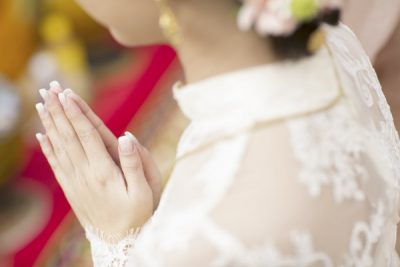
The wai is the Thai greeting and show of respect, indicated by pressing your palms together near your chest and bowing. Why wai? As a foreigner, you will show and receive respect by following this customary greeting, although many Thais will also (somewhat reluctantly) accept a handshake from you.
The wai is a unique, graceful action practiced throughout Thailand. It plays a very important part in showing respect and is central to Thai etiquette. For the most part Thais do not want to touch your sweaty, grubby little hands, so it’s a good idea to learn how to wai. The European kiss-on-each-cheek-greeting will certainly alarm a Thai, especially if you are a man doing this to a woman who isn’t your wife or girlfriend!
The wai can be very confusing, especially at large gatherings when you feel like you have been waiing, bowing and smiling a hundred times. However, the plus side is, when being wai-ed to by others you do start to feel quite important!
When being wai-ed to, you would be considered impolite if you didn’t return or at least acknowledge the wai – something especially difficult to do when you are carrying a lot of bags or in the middle of stuffing your face when someone sneaks up on you. At the very least, you can grunt and nod. Only monks and royalty do not need to return a wai.
As well as being a greeting, a wai is a show of respect. It can be difficult to determine when you should wai or when someone should wai you. As a foreigner, it’s just easiest to wai important people as soon as possible. If someone is going to wai you first, they probably already beat you to it.
However, if you really want to know when to wai, this depends on your relationship to the other person. The person of higher social status will be wai-ed to. You have only a few seconds to size up someone you meet and determine this, but it’s best to err on the side of waiing first if you are unsure.
One easy determination is age. If someone is older than you, then you should wai them unless they are someone whom you employ, such as a housekeeper. Additionally, you should never wai to anyone who you are paying for service, such as waiters, tailors, vendors, shopkeepers or taxi drivers. You also wouldn’t wai your peers and friends. Alternatively, when leaving a party or other such gathering, you should wai everyone, as this is the polite way to excuse yourself from the festivities.
You will also wai when receiving a gift from a superior, as a sign of thanks. Make your wai before you reach to take the object. While listening to a Buddhist sermon, it is also customary to hold a wai during the entire programme. You may even notice that as drivers of vehicles pass a sacred monument, they will wai – even taking their hands off the wheel!
If all that wasn’t confusing enough, there are different kinds of wais! The normal wai is with your hands pressed together at about chest level, presenting a slight bow with your body. The wai to a superior is with the tips of your fingers at nose level, still bowing your body. To convey the most respect and gratitude, you will wai with your fingertips at mouth level and present a deeper and longer bow.
The wai is a delicate, graceful gesture when performed by Thais. It may look somewhat more awkward and downright funny when you do it, but the attempt will still be most appreciated. It might take you some time to perfect your technique, but this charming greeting will become second-nature in no time at all!
